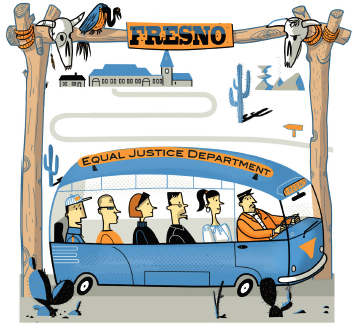Law Students Offer REAL Legal Services through Public Interest Clearinghouse Project
Most Stanford Law students would like to make time for pro bono legal work while they are studying. But finding that precious time can be a challenge. Julia F. Kane ’10 should know. A computer science/JD joint degree candidate, Kane is working around the clock to complete her studies. After spending her summer as an associate with Morrison & Foerster LLP in its patent prosecution practice, she finally had a few days to spare. As luck would have it, the Public Interest Clearinghouse (PIC) Rural Education and Access to the Law (REAL) Project was gearing up for an August trip to Watsonville, Calif., where law students had the opportunity to take their new legal skills out of the classroom. She jumped at the chance.

REAL was managed until recently by law school alumna Salena Copeland ’07, who was the Equal Justice Works AmeriCorps Legal Fellow at PIC, working under the direction of yet another Stanford Law alumna Julia Wilson ’98, the executive director of PIC and the Legal Aid Association of California (LAAC). Copeland, who finished her fellowship in August and is now the program attorney at LAAC, recruited students—most from law schools that support the program such as Stanford Law, USF, and McGeorge—for one- to three-day trips to rural California and Central Valley cities such as Fresno and Bakersfield.
Since the first REAL trip was organized in 2007 there has been a total of 22 legal advice workshops, according to Copeland, and more are planned. Students staff workshops on topics ranging from mortgage foreclosures to advanced health care directives and wills to telecom advocacy. The day typically begins with a presentation by a local attorney, and then appointments are taken for consultations. Working under the supervision of local attorneys, students serve in a variety of capacities, often gaining valuable client interaction by conducting intake interviews and reviewing documents.
“The client interaction was important. I hadn’t had that before. And the attorneys we worked with were wonderful,” says Kane. “That this trip was organized at a time I could fit it in was so fortunate. I’m really glad I had the experience.”
“I participated in the post-Katrina Student Hurricane Network and that experience affected the way I envision the delivery of legal services,” says Copeland. “This project is valuable not only as a service to clients, and there have been almost 700 so far, but also to busy students.”
